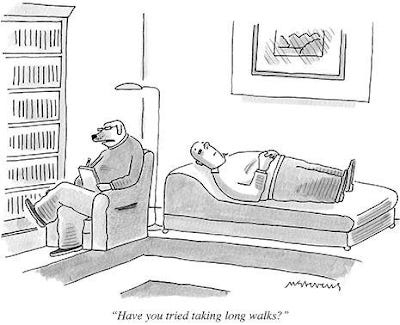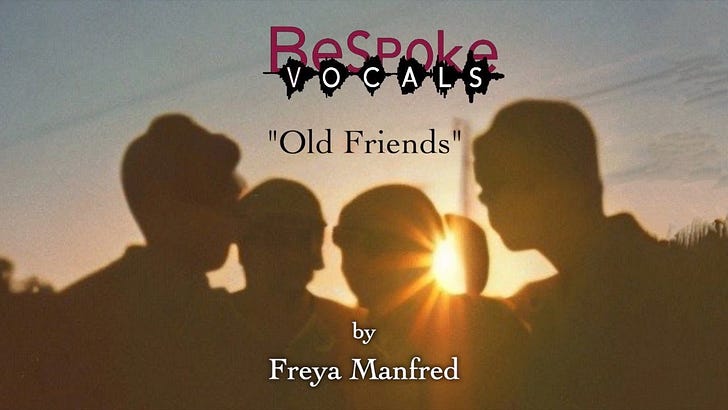Continuing reflections caught at daybreak, in a WJ-at-Chocorua ("doors opening outward") state of mind... https://philoliver.substack.com (Up@dawn@Substack)... @osopher@c.im (Mastodon)... @osopher on Threads & IG
Saturday, September 30, 2023
Friday, September 29, 2023
Social Anxiety Disorder-“SAD”
"…The best way to treat social anxiety is through cognitive behavioral therapy or medication -- and often both..." WebMD
Meanwhile, speaking as an amateur therapist and again passing along the advice of my canine pals, I counsel a few more long walks.
Thursday, September 28, 2023
Tuesday, September 26, 2023
Tennessee, on the cutting edge…
"…Tennessee shows what gerrymandering does at the state level. There, Republicans tend to get about 60% of the votes but control 76% of the seats in the House and 82% of the seats in the Senate. This supermajority means that the Republicans can legislate as they wish.
Gerrymandered seats mean that politicians do not have to answer to constituents; their purpose is to raise money and fire up true believers. Although more than 70% of Tennessee residents want gun safety legislation, for example, Republican legislators, who are certain to win in their gerrymandered districts, can safely ignore them.
Tennessee shows the effects of gerrymandering at the national level as well. Although Republican congressional candidates in Tennessee get about 65% of the vote, they control 89% of Tennessee's congressional delegation. In the elections of 2022, Florida, Alabama, and Ohio all used maps that courts have thrown out for having rigged the system to favor Republicans. The use of those unfair maps highlights that the Republicans took control of the House of Representatives by only the slimmest of margins and explains why Republicans are determined to keep their gerrymanders.
Because their seats are safe, Republicans do not have to send particularly skilled politicians to Congress; they can send those whose roles are to raise money and push Republican ideology. That likely explains at least a part of why House Republicans are no closer to agreeing on a deal to fund the government than they have been for the past several months, even as the deadline is racing toward us, and why they are instead going to hold an impeachment hearing concerning President Joe Biden on Thursday..."
https://open.substack.com/pub/heathercoxrichardson/p/september-25-2023?r=35ogp&utm_medium=ios&utm_campaign=post
Sunday, September 24, 2023
Walking like a Stoic
https://open.substack.com/pub/donaldrobertson/p/how-to-walk-like-a-stoic-e1a41c8d5af0?r=35ogp&utm_medium=ios&utm_campaign=post
Saturday, September 23, 2023
The Beauty of a Silent Walk
No talking. No podcasts. No music. Just some time alone with your thoughts.
Walking in silence is an ancient tradition rooted in mindfulness, a form of meditation that helps people focus on the physical sensations, thoughts and emotions of the present moment, without any judgment.
The fact that the silent walk is nothing new has attracted a chorus of critics; "Gen Z thinks it just invented walking," they say.
To that, Arielle Lorre, 38, a content creator in Los Angeles, had to laugh.
"Fifteen or 20 years ago, this would not have even been a conversation," said Ms. Lorre, who has often discussed the benefits of silent walks, most recently on her podcast and on TikTok. But silent walking feels relevant right now because many of us have become tethered to our devices, she added.
The question then becomes: "How do we counteract that?" Ms. Lorre said.
Walking is a well-established balm for the mind and body. Research has shown that walking for as little as 10 extra minutes a day may lead to a longer life. And a 2020 study in The Journal of Environmental Psychology found that a 30-minute walk in an urban park reduced the amount of time that people dwelled on negative thoughts. Walking has also been shown to improve creativity and help fend off depression... nyt
Wednesday, September 20, 2023
Minneapolis, 1969
In the summer of 1969 I was 12, visiting Minneapolis with my parents. Suddenly got very sick in a downtown department store, was hospitalized. The staff got the Twins to send over an 8 x 10 signed glossy of Rod’s teammate Bob Allison. I’d rather have had Rod but I was thrilled, nonetheless.
Now that I'm thinking about it, a memory comes back of laying in my hospital bed in Minneapolis listening to Top 40 Radio, In the Year 2525. I was sick, but that's a happy memory. That's what I was talking about in class yesterday, the delight of old memories unexpectedly revisited.
Funny how the mind works.
Monday, September 18, 2023
Sunday, September 17, 2023
Saturday, September 16, 2023
Why I love baseball
by a spirit of uselessness/which delights them--" etc. But mostly for me I think it's just the way it connects my 66 year-old self with the 6-year old who cheered for the '64 Cards in the WS against the Yanks, and with my dad, and my daughters...
Old friends
http://dlvr.it/SwBlhB
Old Friends
Old Friends
Friday, September 15, 2023
Thinking before speaking

Works for me, though I have to stay at the office—school—teaching til 6 and sometimes (last night) 9. But yes indeed, thinking before work is better. Especially if work involves emitting words others might actually hear.
Thursday, September 14, 2023
From Plato to Plotinus to Augustine to Christianity: “we are not very real at all”
"The most influential philosopher of the third century… is Plotinus (AD c. 205–270), a pagan teacher who studied in Alexandria and taught in Rome. His philosophy is otherworldly, deeply religious and entirely unmoved by scientific curiosity. Typically for his times, he tried to combine the ideas of many earlier thinkers while revering Plato above all. The mystically inclined thought of Plotinus inaugurated the final phase of Greek philosophy as it tottered over the brink of reason into occultism and religion. It was perfect for St Augustine (AD 354–430), who sometimes claimed that it contained everything that was important in Christianity except for the figure of Christ himself. It would be truer to say that Christian theology came to adopt many of Plotinus' ideas, partly thanks to the efforts of St Augustine.
Plotinus 'seemed ashamed of being in the body', said his pupil and biographer, Porphyry (AD c. 232–305). Plotinus thought of earthly life as a second-rate sort of existence, like that of the manacled prisoners in Plato's gloomy Cave. Inspired by Plato's talk of immaterial souls and of the ideal Forms which earthly things dimly reflect, he urged his pupils to focus on a higher spiritual realm. What he tried harder than any earlier Platonist to achieve was a grasp of the relation between the lower and higher orders of reality. Plato himself did little more than gesture towards a higher world, but Plotinus tried to draw a map that would show how and where the two realms were connected. The resulting theory, with its rhapsodic descriptions of obscure hierarchies, was spasmodically revived later on in European thought. Historians since the nineteenth century have generally called it 'Neoplatonism' to mark the fact that it goes beyond anything found in Plato.
Plotinus knew that he was trying to describe the indescribable. The goal of his philosophy was union with a God-like One, which he claimed to have experienced himself now and then. But although he could report such fleeting experiences of union, their very nature meant that he could not say much about them. He held that the One was beyond rational comprehension. It was so far above everything else that no ordinary concepts applied to it. In a sense, he admitted, it was misleading to refer to it as the 'One', because this invited the unanswerable question 'one what?' The One (or whatever) could not even be called a being, because it was 'beyond being', to use a phrase of Plato. Plotinus wrote that 'nothing can be affirmed of it—not existence, not essence, not life—since it is That which transcends all these'.
The One transcends everything else because it is the source of everything else. One of Plotinus' favourite images for evoking the indescribable way in which everything comes from the One is 'emanation'. Reality streams out of the One like light emanating from the sun. But this analogy is imperfect because it does not capture Plotinus' idea of a hierarchy of realities. Perhaps a more useful image is that of a cascading fountain in which everything flows from a pinnacle, the One, down to successive tiers below it. This flow from the One must not be thought of as a physical process, though. Indeed it is not really a process at all, because it is timeless. What Plotinus is trying to express is a truth about what lies behind nature as a whole; he is not just describing a particular natural phenomenon that can be explained in terms of cause and effect.
There are three main tiers to Plotinus' metaphorical fountain, each one in some sense 'overflowing' to produce what is below it. Below the spout-like One comes the level of Intellect, and below that comes the level of Soul. At the level of Intellect we find Plato's ideal Forms, which are also regarded as living intelligences of some sort. Intellect is an overflowing of the One, and Soul is an overflowing of Intellect. Soul can itself be divided into several subsidiary tiers, the lowest of which creates or overflows into the visible universe. Matter on earth is the lowest of the low. It is furthest from the One, which Plotinus also calls the Good, and this means that it is evil. Evil is a purely negative concept for Plotinus, connoting the furthest possible distance from the One or Good.
There are many degrees of reality for Plotinus, just as there are many degrees of goodness. Some things are more real than others, and the closer they are to the One, the more real they are. By this curious expression he does not just mean, for example, that horses are 'more real' than unicorns because horses exist and unicorns do not. What he means is that there are many gradations of reality even among existing things. Even if unicorns actually existed, he would still put them low down on his ladder of reality because they would still be nothing more than physical things—and Plotinus did not think much of those. This idea is a sort of perfectionism carried to extremes. Nothing can be regarded as fully real unless it is in every sense complete and perfect, which no physical thing is. For Plotinus, only the One that is absolutely complete. It is 'supremely adequate, autonomous, all-transcending, most utterly without need.' so only the One is absolutely real. Intellect is less real than the One, Soul is less real again, and we are not very real at all…"
— Dream of Reason: A History of Western Philosophy from the Greeks to the Renaissance by Anthony Gottlieb
https://a.co/3OEvDC5
Wednesday, September 13, 2023
Sadly, most people don’t know this…
Novels solve what philosophers call "the problem of other minds." It's the problem that we can never know for sure what a person is thinking, or, from a metaphysical perspective, if they even have a mind at all! We must infer, we must guess, we must speculate. Novels, however, take place in an imaginary world where the problem of other minds does not exist, where mental states, like rage or ennui, can be referred to as directly as one does tables and chairs. There's an entire academic field that highlights this, like Dorrit Cohn's Transparent Minds, published in 1978, in which she emphasizes that this is "the singular power possessed by the novelist: creator of beings whose inner lives he can reveal at will." Or as another scholar put it: "Novel reading is mind reading." … (Nautilus)
Massimo Pigliucci
https://open.substack.com/pub/figsinwinter/p/suggested-readings-530?r=35ogp&utm_medium=ios&utm_campaign=post
Monday, September 11, 2023
Celebrating the fortuitous swerve of existence
"Epicurus was no hedonist. He was a “tranquillist.”
Some psychologists take exception with Epicurus’s focus almost exclusively on pain relief. “Happiness is definitely something other than the mere absence of all pain,” sniffs the Journal of Happiness Studies.
Before reading Epicurus, I would have agreed. Now I’m not so sure. If I’m honest with myself, I recognize that what I crave most is not fame or wealth but peace of mind, the “pure pleasure of existing.” It’s nearly impossible to describe such a state in terms other than that of absence.
Avoiding pain is sound advice—I’m all for it—but isn’t it an awfully thin basis for a philosophy? Not if you’re in pain, Epicurus thought. Imagine you’ve fallen from a horse and broken your leg. A doctor is summoned and promptly offers you a bowl of grapes. What’s wrong? The grapes are pleasurable, aren’t they?
This absurd situation is the one many of us find ourselves in, Epicurus believed. We scoop trivial pleasures atop a mountain of pain, and wonder why we’re not happy. Some of us suffer the sharp shock of physical pain, others the dull ache of mental pain or the I want-to-die pain of a broken heart, but pain is pain, and we must address it if we hope to achieve contentment.
“We are only born once—twice is not allowed,” he said. Every human life, Epicurus believed, is the fortuitous product of chance, a swerve in atomic motion, a miracle of sorts. Shouldn’t we celebrate that?"
"The Socrates Express: In Search of Life Lessons from Dead Philosophers" by Eric Weiner: https://a.co/g3mFh61
9/11
Epicurus on “the most savory dish”and “the most agreeable moments”
"… a correct comprehension of the fact that death means nothing to us makes the mortal aspect of life pleasurable, not by conferring on us a boundless period of time but by removing the yearning for deathlessness. …
This, the most horrifying of evils, means nothing to us, then, because so long as we are existent death is not present and whenever it is present we are nonexistent. …
The sophisticated person neither begs off from living nor dreads not living. …
As in the case of food he prefers the most savory dish to merely the larger portion, so in the case of time he garners to himself the most agreeable moments rather than the longest span…"
https://open.substack.com/pub/figsinwinter/p/epicurus-on-death-and-the-gods?r=35ogp&utm_medium=ios&utm_campaign=post
Friday, September 8, 2023
Feel the Bern
"Sanders says his interest in politics began at a young age. He says: "A guy named Adolf Hitler won an election in 1932. He won an election, and 50 million people died as a result of that election in World War II, including 6 million Jews. So, what I learned as a little kid is that politics is, in fact, very important.
On his way to becoming a U.S. senator, Sanders was active in the Civil Rights movement while at the University of Chicago, served as the mayor of Burlington, Vermont, for three terms, and has also been a Head Start teacher, a carpenter, and a filmmaker.
Sanders is fond of calling himself"democratic socialist," saying: "All that socialism means to me, to be very frank with you, is democracy with a small 'd.' I believe in democracy, and by democracy I mean that, to as great an extent as possible, human beings have the right to control their own lives. And that means that you cannot separate the political structure from the economic structure. One has to be an idiot to believe that the average working person who's making $10,000 or $12,000 a year is equal in political power to somebody who is the head of a large bank or corporation. So, if you believe in political democracy, if you believe in equality, you have to believe in economic democracy as well."
https://open.substack.com/pub/thewritersalmanac/p/twa-from-friday-september-8-2017?r=35ogp&utm_medium=ios&utm_campaign=post
“Baseball is crucial to my sense of order in the universe…”
Mine too. My Cards have folded, but "Go Cubs Go!"
"…baseball is still baseball. The double play is as exciting as ever and the bases-loaded homer and even more exciting, the triple and the double-steal, the runner on first heading for second, the long throw as the runner on third comes home."
Preach, GK!
https://substack.com/profile/5303833-phil-oliver/note/c-39751786?r=35ogp&utm_medium=ios&utm_source=notes-share-action
“What’s your ikigai?”
There is a single Japanese word that encapsulates all such questions: ikigai. According to the Oxford English Dictionary ikigai is "a motivating force; something or someone that gives a person a sense of purpose or a reason for living."
So a very good, and deceptively simple question is: what's your ikigai?"
…
https://open.substack.com/pub/figsinwinter/p/whats-your-ikigai?r=35ogp&utm_medium=ios&utm_campaign=post
Concern for the health of American democracy
"Americans have a strong interest in supporting democratic movements and respect for human rights around the world because free societies elsewhere contribute to our own security and prosperity here at home," the statement reads. "But that interest is undermined when others see our own house in disarray." Without mentioning names, it called on elected officials to restore trust in public service by governing effectively "in ways that deliver for the American people." "The rest of us must engage in civil dialogue," it said, "respect democratic institutions and rights; uphold safe, secure, and accessible elections; and contribute to local, state, or national improvement."
Traditionally, ex-presidents do not comment on politics, and this extraordinary effort is the first time presidential centers have commented on them. Because this step is unprecedented the Eisenhower Foundation chose not to sign, although it commended the defense of democracy. But the centers for Hoover, Franklin D. Roosevelt, Harry S. Truman, John F. Kennedy, Lyndon Baines Johnson, Richard Nixon, Gerald Ford, Jimmy Carter, Ronald Reagan, George H. W. Bush, Bill Clinton, George W. Bush, and Barack Obama all did.
That the executive director of the George W. Bush Institute felt obliged to take a step that is a veiled critique of today's Republican Party—Bush's party—is a sign of how deep concern over our democracy runs. David Kramer, the Bush Institute's executive director, said the statement was intended to remind Americans that democracy cannot be taken for granted and to send "a positive message reminding us of who we are and also reminding us that when we are in disarray, when we're at loggerheads, people overseas are also looking at us and wondering what's going on."
…
https://open.substack.com/pub/heathercoxrichardson/p/september-7-2023?r=35ogp&utm_medium=ios&utm_campaign=post








